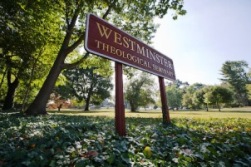Westminster Board Statement
September 25, 2008

Statement from the Board of Trustees
Westminster Theological Seminary
September 24, 2008
On July 23rd, the resignation of Professor Peter Enns was announced. This event was the
culmination of intense and lengthy faculty and board discussions and deliberations. Out
of a desire to continue the theological transparency that the Seminary evidenced by its
release in April of several pertinent theological documents, the Board wishes to state its
understanding of the significance of this eventuality.
First, the Board recognizes that theological debate is a necessary part of the pursuit of the
meaning and application of God’s eternal Word to man’s changing world. This is one of
the foundational reasons why Westminster has cherished its Biblical and Confessional
heritage. The authority of the Scriptures and, subordinate to that authority, the parameters
for theological discussions afforded by the Westminster Standards are safeguards to
preserve the Church and her leaders from the lure of cultural compromise, the deceptions
of autonomous reason, and the fads of theological trends.
Second, Westminster continues to value its legacy of rigorous scholarship that does not,
in the words of founding Old Testament Professor Robert Dick Wilson, “shirk the
difficult questions.” Likewise, the Seminary continues to value its legacy of rigorous
scholarship in the service of Biblical orthodoxy for the good of the church. Only in this
way can J. Gresham Machen’s vision for a Seminary that trains “Specialists in the Bible”
be possible.
Third, the theological issues raised, directly or indirectly, in the controversy prompted by
Professor Enns’ writings need to be briefly addressed. In sum, the Board wishes to reassert
that the self-witness of Scripture to its truth as the Word of God requires that its
authority, its reliability, its non-mythical character as well as its uniqueness, must be
maintained in all discussions and evaluations of extra-Biblical evidence. Moreover,
Westminster’s apostolic Christ-centered model of interpretation of Scripture must
continue to be given pre-eminence in hermeneutical questions whether they emanate
from ancient or historical cultural contexts or from newer interpretive paradigms.
Further, when questions of the NT’s use of the OT occur it must be remembered that the
Scriptures are “the only infallible rule of faith and practice,” and that they therefore must
be interpreted by the “infallible rule of interpretation of Scripture,” which is as our
Confession declares, “Scripture itself.” (1.9).
In conformity with the Scriptures and our Confession the Board once again declares that
the Scriptures “are given by inspiration of God to be the rule of faith and life.” (1.2); and,
that “holy Scripture…is to be received, because it is the Word of God.” (1.4).
In sum, the Board wishes to reassure our constituencies and to assert to the watching
world that it is still the core commitment of Westminster Theological Seminary to
prepare pastors, leaders and scholars for the Church and the Kingdom of Christ. Such
specialists in the Bible are discerning believers in Scripture who do not shirk the difficult
questions, but who also address such questions from the vantage point of Westminster’s
historic heartfelt (ex animo) vow to the infallible Word of God.

